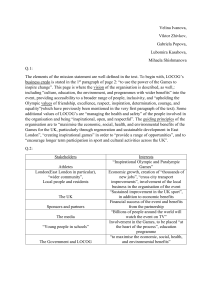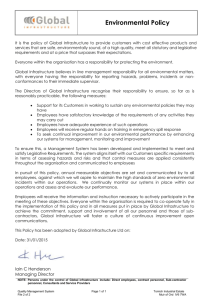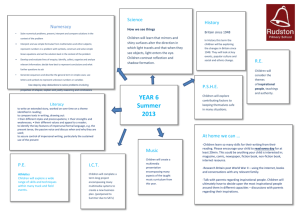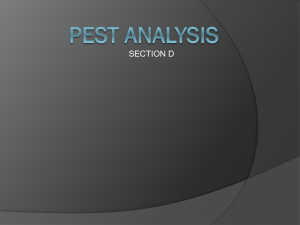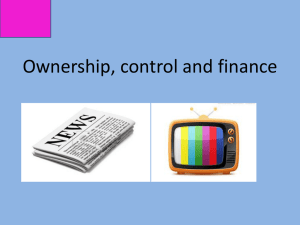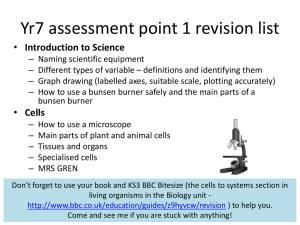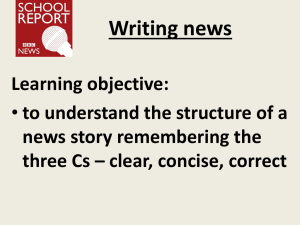Vision, Mission and Values
advertisement
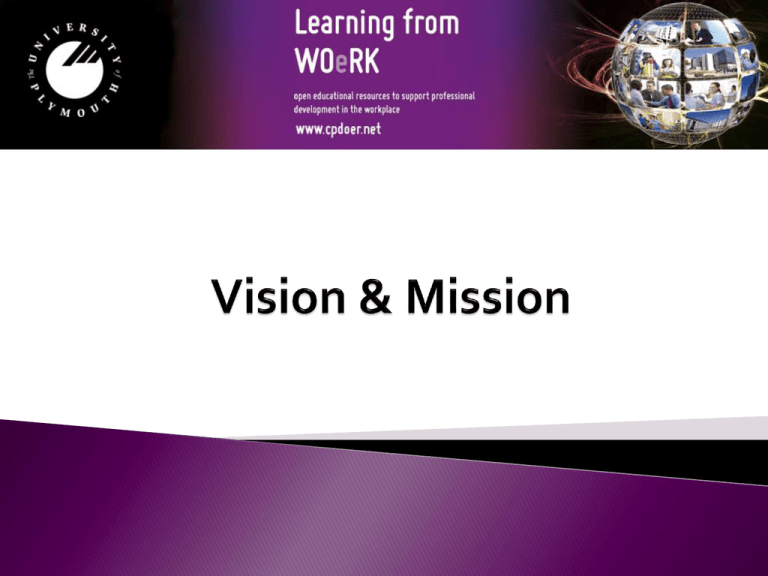
A study by Bain and Company indicated that organizations that have clearly defined Vision and Mission statements that are aligned with a strategic plan, outperform those who do not. Vision – what is it? • the guiding principle for a social enterprise – it’s the ‘reason why’ • states the core purpose of the business • a long-term principle •Defines the optimal desired future state - the mental picture of what an organization wants to achieve over time; Provides guidance and inspiration as to what an organization is focused on achieving in five, ten, or more years; Functions as the "north star" - it is what all employees understand their work every day for; Is written in an inspirational manner that makes it easy for all employees to repeat it at any given time. Visions should • be inspirational – and aspirational • be memorable • be defined from the start • be clear • be used as a framework for monitoring and evaluation Mission – what is it? • a practical statement • informs how and what a Social Enterprise must do to deliver it’s mission • may change with time “If the business plan can be considered the road map of your social enterprise and the vision is the direction in which you are going, then the mission statement consists of the street signs to get there” Alter, KS 2000. What is a Mission Statement? •Defines the present state or purpose of an organization; •Is written in the form of a sentence or two, but for a shorter timeframe (one to three years) than a Vision statement; •Is something that all employees should be able to articulate upon request. Answers three questions about why an organization exists – WHAT it does; WHO it does it for; and HOW it does what it does. A mission and a vision are statements that have been written to guide certain actions and future states: •A mission is what an organization does, its action; a vision is what an organization would like to happen as a result of the action that it does. •Mission equals the action; vision is the ultimate result of the action. •Mission answers the question: “What would not happen if we were not here as an organization?” Or more positively: “What change is achieved because we exist? •Vision answers the question: “What are the results, the ends, the consequences of our action?” •Vision looks forward; mission looks at today. Vision & Mission – the difference Vision Mission What The ‘dream’ The ‘plan’ Key Characteristic Inspirational, clear, easily communicated Time Frame Long term Identifies how the ‘dream’ will be fulfilled Short – Medium term MOTOROLA „Everything will turn out alright if we just keep in motion, forever moving forward.” MARRIOTT „See the good in people, and try to develop those qualities.” Nissan: "Nissan provides unique and innovative automotive products and services that deliver superior, measurable values to all stakeholders in alliance with Renault." Mercedes: „We invented cars, now we’re passionately shaping their future”. Ford: „We are a global family with a proud heritage passionately committed to providing personal mobilityfor people around the world.” BBC: Vision & Mission Our vision To be the most creative organisation in the world. Our mission To enrich people's lives with programmes and services that inform, educate and entertain. Activity •What are the Vision, Mission and Values in your workplace? Where and how are they communicated? Do they reflect the nature of your organisation? •If they are not explicit, find a similar organisation where they are clearly defined. •Record your thoughts in your learning journal. References Alter, KS 2000 ‘Managing the Double Bottom Line: A Business Planning Reference Guide for Social Enterprises. Pact Publications. BBC – www.bbc.co.uk The Big Issue - www.bigissue.com Cooperatives UK - www.uk.coop Ethical Property Plc - www.ethicalproperty.co.uk Rise – www.rise-sw.co.uk Social Enterprise Coalition - www.socialenterprise.org.uk
